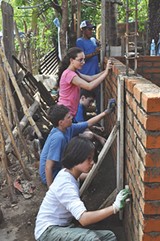[
{
"name": "500x250 Ad",
"insertPoint": "5",
"component": "15667920",
"parentWrapperClass": "",
"requiredCountToDisplay": "1"
}
]
[UPDATED 12/19/2018] Nicaragua is one of the poorest countries in the West, a status due to factors that include natural disasters and decades of political strife, at times fueled by US intervention.
Several organizations based in or deeply connected to the Rochester region help the people of Nicaragua by providing funding, services, and volunteers for such efforts as developing businesses and building houses and schools. The organizations, and Rochester generally, have had a particularly tight relationship with El Sauce, a community of 30,700 located in the northwest part of Nicaragua.
For example, Metro Justice's Ciudad Hermana Task Force has worked in El Sauce for 30 years, providing loans to farmers and women starting businesses, giving scholarships to elementary school students, and sending groups of people to work on humanitarian projects.
But a US State Department advisory about travelling to Nicaragua has complicated some of those organizations' efforts. The travel advisory is based on political unrest in the country. In April, people flooded streets in Nicaragua's cities to protest President Daniel Ortega's plan to raise social security taxes and cut benefits to seniors. Protests against Ortega and his administration have continued, and police have responded with brutal, sometimes deadly force
El Sauce hasn't seen any of the protests or conflicts, but you can't get to the outlying community from the US without travelling through the capital of Managua, which has been a center of conflict, leaders of the Rochester-area groups say.
Enlace Project (enlaceproject.org), which started through SUNY Geneseo, is responding to the situation by refocusing its efforts, says co-founder Kellan Morgan. When it was founded, the organization worked work with El Sauce businesses and cooperatives to help them grow and provide economic opportunities in the community. It's also helped artisans and farmers find buyers for their products internationally, and in Rochester specifically, Morgan says.
The organization plans to continue its community-based economic development work through things such as microloans and scholarships, which can be administered remotely.
Enlace's board decided to suspend the organization's service learning, study abroad, and volunteer trip programs, Morgan says. It had been arranging the programs for several local colleges and universities, including Geneseo, RIT, Keuka College, and SUNY Upstate Medical University.
That decision means a loss of funding for some of Enlace Project's on-the-ground charitable and community-building work, Morgan says. It had to close its offices in El Sauce, he says.
The Friends Project works with the community of Las Minitas near El Sauce, and its programs have been largely unaffected, says Kris Dreessen, the organization's founder. It helped the community build an elementary school in 2011 and it raised the money for and built a preschool in 2014. It now provides two young people from the village with $300 annual scholarships. They're the first people from Las Minitas to go to college; one will be an English teacher, the other a nurse.
In the past, the Friends Project raised the scholarship money by selling coffee grown by farmers in Las Minitas, Dreessen says. But the conflicts in other parts of Nicaragua prevent Dreessen from getting the coffee. But the scholarships will continue, she says.
"I just need to raise money without coffee is all," Dreessen says.
Another local organization, 4Walls Project, has been helping the people of El Sauce build houses, and it's arranged for groups of volunteers to travel to the community and assist with the construction. It's partnered with groups from Hilton, Geneseo, and Dansville high schools; Allendale Columbia School; RIT; and Keuka College.
Typically, the groups raise money to build two or three houses as part of the trip, says Colleen Dunham, a member of 4Walls' board. The organization has helped fund and build 145 houses in El Sauce since 2007.
But no groups have wanted to go since the travel advisory went into effect in April, which means funding for new houses has dropped, Dunham says. And she fears that if volunteers can't or won't travel to El Sauce, the lasting connections that have developed between people there and in the Rochester community will wither.
"The thing that makes it thrive is the connection," Dunham says.
However, the people of El Sauce can still build houses without the volunteers, say 4Walls leaders. The houses were always built using materials sourced in El Sauce, and masons from the community were hired for the brickwork, they say.
But the residents still need money for the labor and materials; each house costs around $2,000. The group's co-founder, Bonnie Yannie, put together a photo journal documenting how the people of El Sauce and the local volunteers work together, which she's selling for $12 a copy. Proceeds will go to the 4Walls Project, as will any additional donations.
The book is available at http://journeysofsolutions.org/our-projects/4-walls-project-nicaragua.
This article was updated to include information about an additional local organization doing work in Nicaragua.Latest in News
More by Jeremy Moule
-

ROCHESTER TEN
ANNETTE RAMOSAug 1, 2023 - More »






